Champions for Children and Corals
Air Date: Week of May 4, 2018
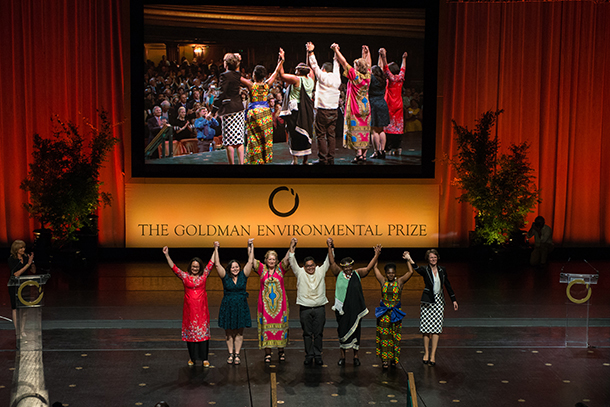
The 2018 Goldman Environmental Prize Recipients accept their awards. (Photo: Goldman Environmental Prize)
Host Steve Curwood continues our coverage of this year’s Goldman Environmental Prize with the winners from Europe and the Island Nations. Filipino Manny Calonzo took on the neurotoxin lead in paint, ubiquitous in his home islands, and won agreements to phase it out by 2020. And safe fishing activist Claire Nouvian of France launched a campaign to end coral-smashing deep-sea bottom trawling in the EU which achieved a ban of trawls below half a mile deep.
Transcript
CURWOOD: Today we continue our look at winners of the 2018 Goldman Environmental Prize. Last week we spoke with Liz McDaid and Makoma Lekalakala from South Africa. Other winners include Francia Márquez, who fought toxic gold mining in Colombia, LeeAnne Walters, who battled lead poisoning in Flint, Michigan and Khanh Nguy Thi who championed green energy in Vietnam. Now we turn to two more grassroots heroes who defended their environment against powerful industry. First here’s Claire Nouvian, a French marine life advocate who pushed relentlessly for a more sustainable fishing policy in the European Union. She joins us now, welcome to Living on Earth Claire!
NOUVIAN: Thank you.
CURWOOD: Now, for those who don't know, explain for us exactly why deep sea trawling is so destructive.
NOUVIAN: Well, deep sea bottom trawling is a fishing technique by which you have giant nets which are sent down to the very deep ocean and they're dragged along the sea floor and they're opened by huge doors, they’re metal doors that make sure that the net stays on the sea floor with ground rollers that take and crush much of life and they're absolutely not selective. They take and pick up anything in their wake. So, you can imagine that after deep sea bottom trawling has gone anywhere, there is pretty much nothing left.
CURWOOD: Yeah, what are some of the worst things that it does?
NOUVIAN: Well, it clear-cuts anything that's on the sea floor, and what's dramatic is that animals that live in the deep sea are really vulnerable to overexploitation. They're very slow growing. They reproduce late, very late. Later than human beings sometimes, you have to bear that in mind, right? And there are animals in the deep sea such as corals that can live thousands of years, and a single fishing net can come and destroy life that took thousands of years to grow. It makes absolutely no sense.
CURWOOD: So, by 2005, I understand that you had founded your own nonprofit organization called Bloom. What does Bloom stand for and what's the mission?
NOUVIAN: So, Bloom's logo is a little piglet squid. You really have to go check it out online. It's so cute, you would die for it.
[CURWOOD LAUGHS]
NOUVIAN: And Bloom was a name that was supposed to convey the message that the world is at a tipping point. If we do the right things, we should have very positive blooms in the ocean of nutrients that nourish life. But if you do the wrong things, if you overfish, then the blooms you get are algae, seaweed, you know, gelatinous things that will invade the ocean. And so, I thought bloom was a good tipping point name. You know, like OK, we've got a few years, we've got maybe a few decades, no more, to really fix the damage we've created, so let's see where that takes us.
CURWOOD: Now, you chose to focus on changing the fishing practices of the supermarket chain Intermarché. What did you focus on, and what was your approach?
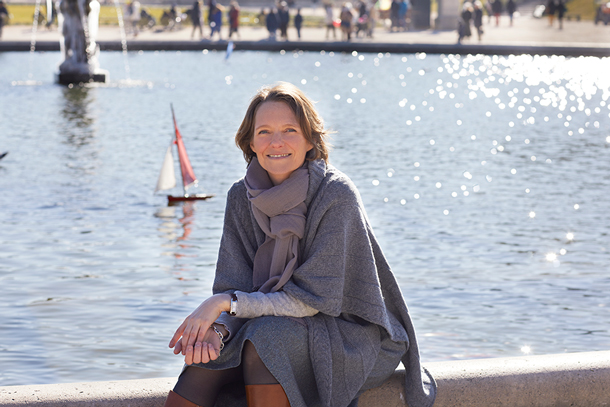
Claire Nouvian is the 2018 European winner for her efforts to end deep-sea bottom trawling in the EU. (Photo: Goldman Environmental Prize)
NOUVIAN: Anything which has to do with fishing in Europe is decided at European level, but of course, because it's 28 member states – well soon 27 with the UK leaving the European Union, you've got a lot of member states to convince but some have more power than others, right, and so there's very important fishing nations. France is one of them, and France usually does a lot of harmful things when it comes to European decision making on fishing, and so France was completely blocking any discussion on a deep sea bottom trawl ban just because it was actually protecting its own industry which is not acceptable, right? And so we had to put a lot of, a lot of pressure on France and also on those that operate deep sea fishing.
Intermarché is a retailer, so of course, the public knows them so that was the only easy bit for us. We could just go on to campaigning right away instead of having to first establish a name. For example, Monsanto. Everybody knows Monsanto nowadays, right, but actually it's not a name that you see on the streets right? It took many years for campaigners to establish that Monsanto is a firm that is doing harmful things. So, we didn't have to go through that. That's the only thing that, at least, was easy. Everything else was difficult.
CURWOOD: So, what was your approach to Intermarché, this supermarket chain?
NOUVIAN: OK, our approach is always first try to cooperate. And so we tried that for two years with all deep sea fleets whether it be Intermarché or others. We really tried to share information. We thought, “’You know, they are ignorant. They don't know what's going on in the deep sea.”’ We need to tell them. That was a bit naive of me because I thought, you know, we need to educate them and once they're educated they will, of course, make the right decision. But of course they did not.
So, we had to become a little nastier, you know, after two years and we started to investigate their business model and that was really a really interesting bit because nobody had looked into their economic performance. And so we bought the financial accounts of all these deep sea fishing fleets and established ... we were so surprised, they were all pretty much unprofitable, despite receiving very large amounts of public money, public subsidies. So, you've got your own taxpayers' money going into feeding the destruction of the natural world. The most vulnerable marine ecosystems were destroyed because of our taxpayers' money.
CURWOOD: Now, how do France's fishing practices compare to the rest of the EU?
NOUVIAN: Well, France is is a very important fishing nation. So we are like the UK, like Spain. We've got large-scale actors that dominate the debate. They are...I don't even know what to call it. I mean is it collusion, is it complicity? I don't know what, they're so close to public authorities and all decision-making reflects the political representation of the large-scale sector. So, worldwide you'll see this is the same issue. Small-scale actors are not ideal, but they really are as close to good and sustainable as you can get, right, pretty sustainable fishing practices with very few discards. They don't need as much public money at all. These guys get trampled on.
CURWOOD: So, after an extensive campaign the led by your organization, Claire, France has now banned all deep sea trawling below a depth of 2,600 feet. That's a half a mile. How did that feel?
NOUVIAN: Well, that felt like a huge success, but it was a collective win. I have to say there is, the Pew Charitable Trusts really were very helpful, and there's a guy that really needs to be mentioned because he was my deep-sea buddy for all these years. There are two actually. There's a Professor Les Watling from the University of Hawaii who was instrumental in providing very good data and Matthew Gianni, a former commercial fisherman, American person, who just thought what we are doing to the ocean is absolutely gruesome, we should not accept that, and he came on this side of advocacy a long time ago and he made a big difference for the world's oceans. So, yes it was a collective win.
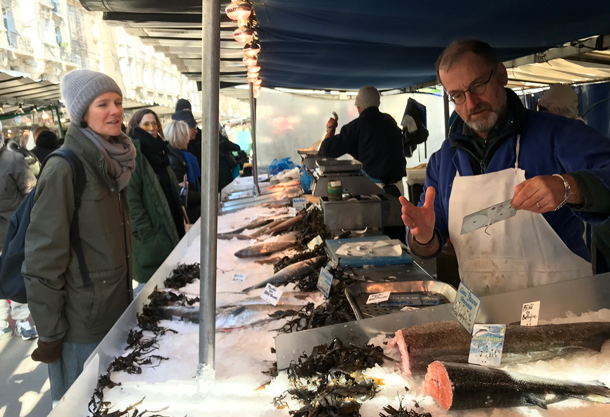
Claire at a fish market. (Photo: Goldman Environmental Prize)
CURWOOD: So, what are your next goals for fishing reform in Europe?
NOUVIAN: OK, well, it's not just Europe. We really have an international important process right now. So, public money going into becoming a bait, like a financial incentive that really creates this overfishing problem at world scale. So, what we really need, we need all nations, which are a member of the World Trade Organization to come together and to start subsidies’ negotiations which they're doing right now.
But they have to come to a deal by 2019 because they have a year and a half where they need to sit down, agree on an international legally binding agreement that's going to make sure that harmful fisheries subsidies that fuel overfishing and overcapacity at a world scale, that needs to stop. I can only encourage media and citizens to really watch and put pressure on all governments. There will be no sustainable fishing, no way, no way ever if we still have the financial incentive. So we need to cut the bait.
CURWOOD: Excellent. Hey, before you go, Claire, how has this award affected your work? What's it meant for you at home in France and in the rest of the EU.
NOUVIAN: So, I can answer that question from a personal capacity because I can tell you what it does to me, but I don't know what it's going to do to my work arena. Will it create an impact? I have no idea. From a personal point of view, this is for me the biggest award ever. For me, it's the only one where corporate money actually really encourages true activists. There's no green-washing here. There's none of that going on. People here take risks, they name, they shame if need be. They have huge corporate enemies and still the Goldman money and the Goldman award goes to them! I mean if the financial sector were inspired by the Goldman Prize, can you imagine what it would do to the world? Imagine the financial sector, on its whole, dropped their bonuses for causes. Can you imagine it would fix the world's problems in 10 years. We would be celebrating in 10 years. So, yeah, maybe I hope that beyond just me, I hope that the corporate and financial sectors get seriously inspired by what happens and what the Goldman Environmental Prize does for people in real life.
CURWOOD: Claire Nouvian is the founder of the ocean advocacy group Bloom and one of this year's Goldman Prize winners. Claire, thanks so much for taking the time with us and again, congratulations.
NOUVIAN: Thank you very much.
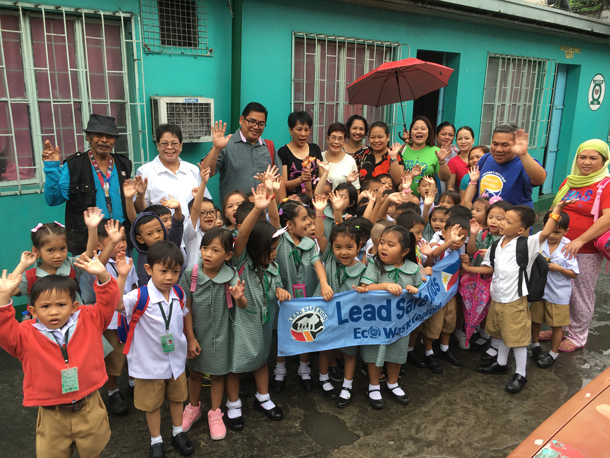
Manny Calonzo is the former director of the Ecowaste Coalition, which works to find sustainable solutions to toxic chemicals and other environmental hazards that impact local communities. (Photo: Goldman Environmental Prize)
CURWOOD: For the Islands Nations category of the Goldman Environmental Prize, this year’s winner was Manny Calonzo, who spearheaded a campaign to eradicate lead paint from the Philippines. He also has his sights set on tackling the lead paint problem in other developing countries. He joins us now – welcome to Living on Earth Manny!
CALONZO: Hello, Steve.
CURWOOD: So, when you began this, how prevalent was lead paint in the Philippines?
CALONZO: Before we started our campaign, we had no understanding that paints being sold in the country contained high concentrations of lead. It was only after we conducted our first study that was way back in 2008 that we realized that it's a huge problem.
CURWOOD: So, what compelled you to become so involved in solving this issue?
CALONZO: In the Philippines the practice of conducting blood lead tests, especially children, is not that common, so it is very difficult to ascertain whether a child is contaminated with lead or not. Assuming all lead in paint has been banned in US since the late 70s, but in many developing countries lead in paint is still widely produced, distributed, sold and used. In the course of our work, we have read about studies and reports in US about kids being poisoned because of their exposure to lead from different sources. And I think there is no question that if lead is bad for American children, it must be bad for Filipino children as well.
CURWOOD: First, I want to understand the studies that you did with eco waste to get hard data on the scope of the lead paint issue. What did you find?
CALONZO: First, we went to the paint stores to conduct a brand survey. We determined which brands and which colors will be bought. We prepared the samples and sent the samples to the laboratory for analysis. In most cases brightly colored solvent-based paints contain high lead concentrations. This would be the yellows, the oranges, the reds and the greens. And especially before the policy was implemented, we saw high concentrations of lead content in most of these paints. We have found dangerous concentrations of lead sometimes above 10,000 to 100,000 parts per million, and when the threshold limit is only 90 parts per million. But the last study we conducted, Steve, was in 2017 and we were so relieved to find out that the percentage of paints containing high lead concentrations have significantly dropped.
CURWOOD: How were you able to persuade the paint industry to make changes?
CALONZO: Yeah, it was the result of our constructive relationship with all the stakeholders, coming from the government, the paint industry, the civil society, the health care sector and academia. With respect to the paint companies we have established a good rapport with the Philippine association of paint manufacturers. We managed to agree on several important points, and one of them is that lead has to be removed from paint formulations in order to protect children's health. I would like to add that our policy also requires the phase out of lead containing paints. We have already completed the three-year phase out period for lead containing paints use for homes, schools, daycare centers, playgrounds and the like. So, by 2020, we hope the Philippine market would be free of lead containing paints.
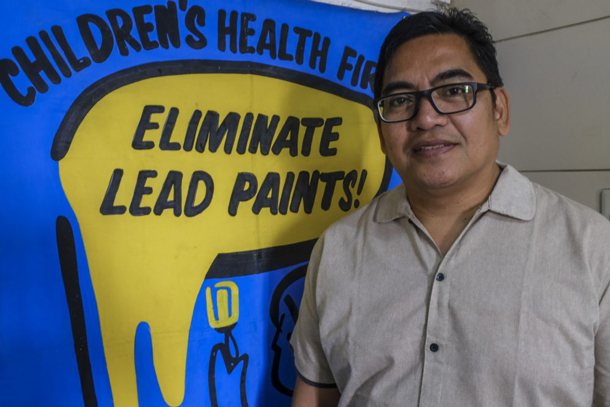
Because of Manny’s efforts, 85% of the paint market has been certified as lead safe in the Philippines, and schools now require lead safe paint. (Photo: Goldman Environmental Prize)
CURWOOD: So, how is the rest of the, of the less developed world doing on the lead paint issue?
CALONZO: There is a global movement to eliminate lead in paint by 2020. The United Nations has developed this collaborative initiative in the form of the global alliance to eliminate lead in paint, which is comprised by governments, industry players, and government organizations and the like. But the movement has been has not been that fast as we have wanted. Since, 2011, a few countries have adopted lead paint regulations. I can name Sri Lanka, Nepal, India, Thailand, Philippines, and more recently Cameroon and Kenya. But we're talking here of hundreds of countries that have yet to adopt mandatory regulations that will ban lead in paint. So, there is a need for more work to be done and for paint makers as well as government regulators together with civil society to come together and agree on a policy that will protect children from lead exposure and phase out lead in paint at the soonest time possible.
CURWOOD: Manny Calonzo is the former president of Eco Waste and a 2018 Goldman Prize recipient. Congratulations, Manny. Thanks so much for taking the time with us today.
CALONZO: Thank you very much, Steve.
Links
Our conversations with two other 2018 Goldman winners
Claire Nouvian is the founder of the NGO Bloom
Living on Earth wants to hear from you!
Living on Earth
62 Calef Highway, Suite 212
Lee, NH 03861
Telephone: 617-287-4121
E-mail: comments@loe.org
Newsletter [Click here]
Donate to Living on Earth!
Living on Earth is an independent media program and relies entirely on contributions from listeners and institutions supporting public service. Please donate now to preserve an independent environmental voice.
NewsletterLiving on Earth offers a weekly delivery of the show's rundown to your mailbox. Sign up for our newsletter today!
 Sailors For The Sea: Be the change you want to sea.
Sailors For The Sea: Be the change you want to sea.
 The Grantham Foundation for the Protection of the Environment: Committed to protecting and improving the health of the global environment.
The Grantham Foundation for the Protection of the Environment: Committed to protecting and improving the health of the global environment.
 Contribute to Living on Earth and receive, as our gift to you, an archival print of one of Mark Seth Lender's extraordinary wildlife photographs. Follow the link to see Mark's current collection of photographs.
Contribute to Living on Earth and receive, as our gift to you, an archival print of one of Mark Seth Lender's extraordinary wildlife photographs. Follow the link to see Mark's current collection of photographs.
 Buy a signed copy of Mark Seth Lender's book Smeagull the Seagull & support Living on Earth
Buy a signed copy of Mark Seth Lender's book Smeagull the Seagull & support Living on Earth

